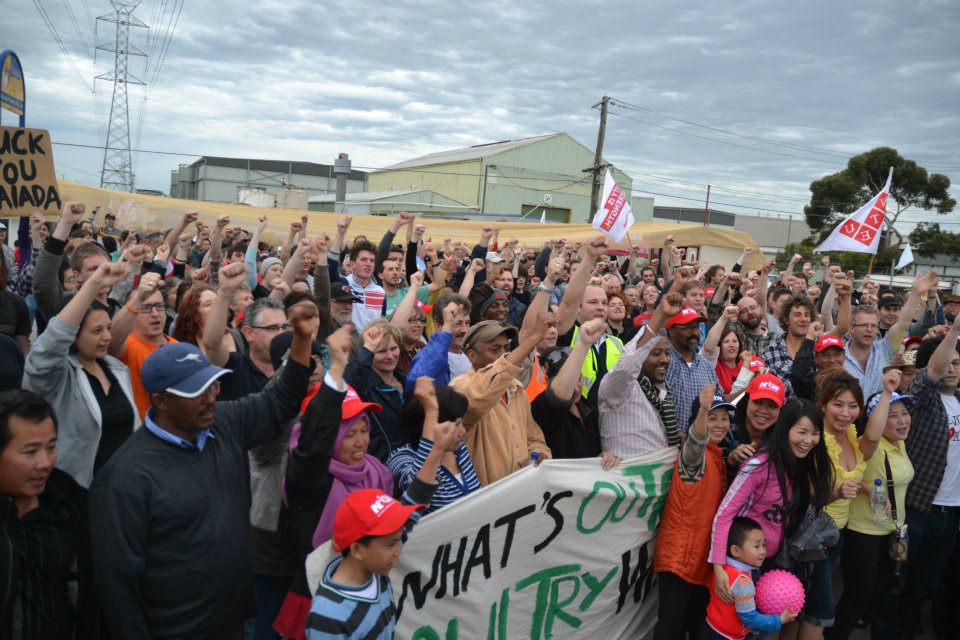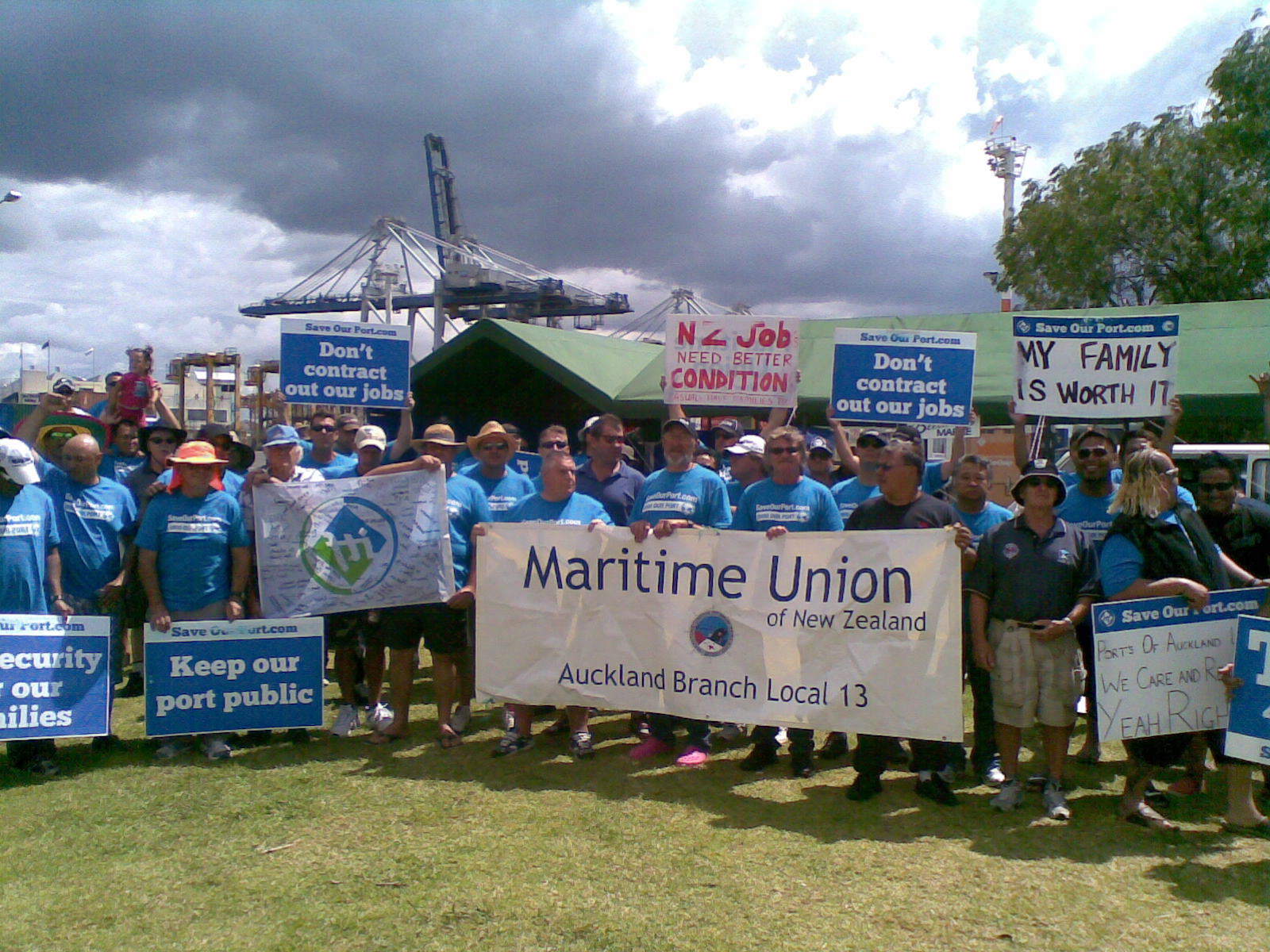 The mood on the picket line at the Ports of Auckland remains staunch and upbeat after the first week of a four week strike. Several of other unions were flying their flags in solidarity, and a steady stream of toots in support flowed from the passing cars, trucks and trains.
The mood on the picket line at the Ports of Auckland remains staunch and upbeat after the first week of a four week strike. Several of other unions were flying their flags in solidarity, and a steady stream of toots in support flowed from the passing cars, trucks and trains.
A number of wharfies I met described their disappointment and anger at the lack of backing they have received from Labour-aligned Auckland mayor Len Brown. The dispute has inevitably taken on a political dimension, as plans to eventually privatise the port become more evident.
The workers pride themselves on the shipshape safety culture they have established over the years on the Auckland wharf. But management continually try to push the envelope: “Young workers are being pressurised to drive the straddle cranes round like stock cars.”
Over the last two days, the workers on the picket line witnessed two ships in port being unloaded by scab labour. Although the sight was a somewhat demoralising, the universal comment from the guys was: “just wait till that ship gets to Melbourne.” A great source of strength for the wharfies is knowing that the International Transport Workers’ Federation has got their back.
This week has seen hundreds of AFFCO meat workers locked out, and their remaining union workmates walking out in solidarity, as well as Oceania aged care workers taking strike action. Most workers instinctively recognise that the Wharfies are currently on the front line of the class struggle in Aotearoa. More power to them!
Why wharfies are striking in their own words
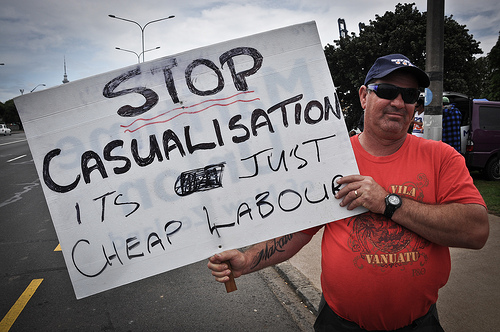
Originally published here, reprinted in February Spark.
The Thorton family: “They want drones when we are actually parents”
Shaun Thorton, 43, drives a straddle at the Ports of Auckland where he has worked for 18 years. He met his wife Leah at the port where she worked before becoming a fulltime mum looking after their four kids: Ben (9), twins Max and Amy (5) and Nina (4).
“We want predictability so we can have a family life,” he says. “We only get one weekend off every third weekend meaning I work 35 weekends in the year. I’m striking for the kids.” Continue reading “Why wharfies are striking in their own words”
CMP/ANZCO dispute shows need for freedom to strike
By editors of The Spark
 In late October 2011 over one hundred workers belonging to the New Zealand Meat Workers Union and employed at the ANZCO-owned CMP mutton processing plant in Marton, in the Manawatu area, were locked out by the company. The company was demanding that the workers take between 20%-30% losses of renumeration. The workers and their site organisers were not prepared to sign on to individual agreements and accept the cuts. Locking-out was a highly aggressive action from the company as lockouts are usually used as a retaliation to strike action. The workers hadn’t taken strike action but the company used locking-out as an ultimatum against those not prepared to accept the cuts. The lockout continued until December 23 when the workers voted to go back to work even though – we understand – they still faced some lesser conditions to those that existed prior to the lockout. The workers and site organiser involved are among the staunchest in the workers movement in the country, however ultimately the company was unable to be defeated.
In late October 2011 over one hundred workers belonging to the New Zealand Meat Workers Union and employed at the ANZCO-owned CMP mutton processing plant in Marton, in the Manawatu area, were locked out by the company. The company was demanding that the workers take between 20%-30% losses of renumeration. The workers and their site organisers were not prepared to sign on to individual agreements and accept the cuts. Locking-out was a highly aggressive action from the company as lockouts are usually used as a retaliation to strike action. The workers hadn’t taken strike action but the company used locking-out as an ultimatum against those not prepared to accept the cuts. The lockout continued until December 23 when the workers voted to go back to work even though – we understand – they still faced some lesser conditions to those that existed prior to the lockout. The workers and site organiser involved are among the staunchest in the workers movement in the country, however ultimately the company was unable to be defeated.
Continue reading “CMP/ANZCO dispute shows need for freedom to strike”
Mana: We Support the Wharfies
 “MANA supports wholeheartedly the rights of the wharfies who work for the Port of Auckland,” states MANA leader Hone Harawira. Harawira says “Workers across the country need to wake up and smell the coffee – if the wharfies lose this fight then the casualisation of working hours will become a permanent feature of employment in this country. Everybody who earns a low to middle income job will have to wait by their phones for their boss to call to see if they are working or not, not knowing how many hours they will work and be paid for each week.”
“MANA supports wholeheartedly the rights of the wharfies who work for the Port of Auckland,” states MANA leader Hone Harawira. Harawira says “Workers across the country need to wake up and smell the coffee – if the wharfies lose this fight then the casualisation of working hours will become a permanent feature of employment in this country. Everybody who earns a low to middle income job will have to wait by their phones for their boss to call to see if they are working or not, not knowing how many hours they will work and be paid for each week.”
“As a country we should be doing our utmost to back our wharfies. Despite the efforts of National and the country’s media to make this dispute about money, this is all about having reliable and stable employment. The workers want to know that they have a set number of hours per week. If it was about the money why would they only want to settle for a 2.5% pay rise when they are being offered 10%? What I don’t understand is why the workers are being held responsible for risks to the business. Tony Gibson will get his huge salary each week no matter what and the Council wants a 12% return on capital no matter what. It is the wharfies who are expected to pay the price each week if business is down. Under any other business regime, the owner is the one who takes the risk, not the workers!
“As for politicians saying that we should not get involved, what a load of crap. This dispute became political when Rodney Hide set up the appointments of the Board of Directors for the port…
“In 1951 there was a watershed strike involving wharfies. Today we are faced with another defining moment regarding employment rights in this country. Rest assured that if the wharfies lose then this right wing Government will see it as an endorsement to go ahead with the casualisation of hours and it will be another blow to the union movement, a movement that has for so long protected blue collar workers.”
Firefighters and Port Workers Continue Struggle
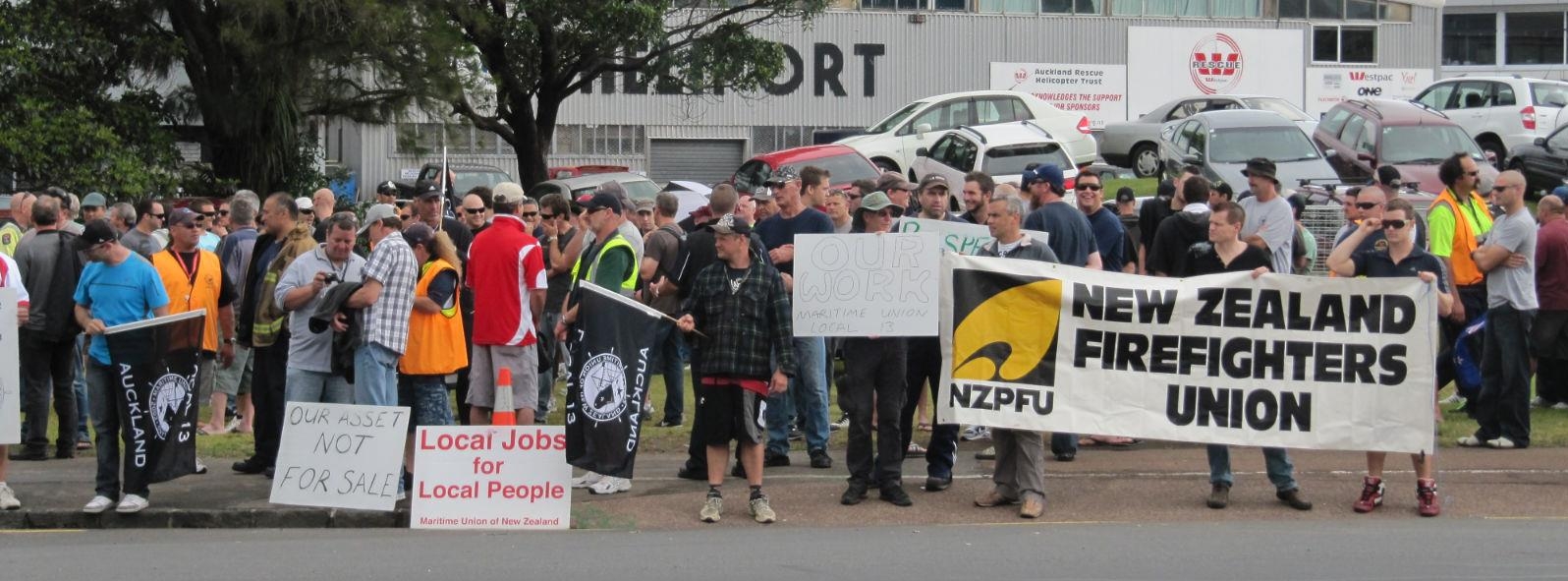
There are significant labour struggles going on with firefighters and port workers. Firefighters have been taking industrial action since August 5th. “They are still carrying out emergency response work, firefighter safety work and public safety work but not general duties.” Auckland union president Mike McEnaney told Stuff.co.nz. The professional fire service is strongly unionised- with 99% of New Zealands paid firefighters.
While no ones saftey is put at risk by the industrial action being taken, it has had an impact. The Herald reported a “media black out on emergency news” as reports from the control room are not being sent to media organisaions. Reports are also not being supplied to insurance companies and bills related to fires are not being sent out. Continue reading “Firefighters and Port Workers Continue Struggle”
Australia: Baiada Workers Win Strike
Originally posted by the Socialist Party of Australia.
Workers at Baiada Poultry, Australia’s largest chicken supplier, have won their dispute with management after a 13 day strike. The workers stared down bullying, intimidation and police violence without any sign of wavering. It was this determination that forced this rouge employer to retreat and concede to the bulk of their demands.
Primarily the workers were fighting for a union agreement which included a decent pay rise, job security and improvements to health and safety – particularly they wanted an end to the constant bullying and harassment that takes place on a daily basis.
Southern Paprika Limited dispute outcome
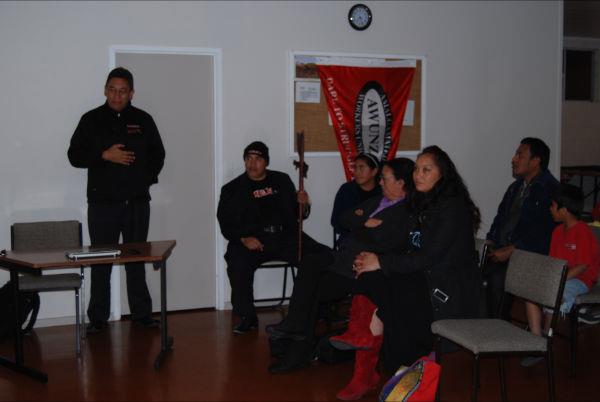
The following article updates on an earlier post on this blog in which we reprinted a September 7 press release by the Northern Amalgamated Workers Union.
On the 28th of September SPL (Warkworth) and Northern AWUNZ Union signed an agreement brokered through the Department of Labour to settle their dispute over the 13 workers made redundant on 4 October. All 13 of the workers made redundant will receive offers of permanent seasonal employment of 5-9 months per year starting on 7 November. This offer is in addition to the affected workers being given 2 weeks pay in lieu of notice, and redundancy pay of 4 weeks for the first year of service, plus 2 weeks for each subsequent year of service. The Labour Dept was satisfied that the outcome meant that the Recognised Seasonal Employer (RSE) workers were no longer displacing Permanent Resident workers.
The deal was unanimously endorsed at a meeting of the affected workers, and the union considers the outcome to be the best one achievable in the circumstances. The union understands that all of its affected members will be taking up the Company’s offer of permanent seasonal employment in November. The RSE workers will also benefit: the union was told by the company that the small increase above the minimum wage it negotiated in April will also be paid to the RSE workers who arrive next month.
The Union and the local Kiribati community had launched a lively campaign in response to the redundancies. A meeting attended by about 40 I-Kiribati workers was held in Warkworth on 14 September. Mana leader Hone Harawiri spoke, urging the workers and Kiribati community to push forward the struggle themselves. Harawira had also done a lot of work behind the scenes to get the Dept of Labour along to the meeting and getting them to force the company to participate in mediation. The star of the show was Mana activist Jesse Pene, who turned up, complete with a ceremonial fighting staff, and proceeded to give a rousing speech about how he was part of a militant struggle against redundancies by construction workers at the Aotea centre back in the day. He urged the workers to take strike action to defeat the redundancies and finished by appealing to those workers with residency to party vote Mana. His korero was greeted by rapturous applause by the I-Kiribati.
The negotiated deal represents a partial victory for the workers, considering the odds they were up against (i.e. workers from one of the poorest countries on earth versus a boss who is personal friends with John Key and Lockwood Smith). Union Organiser Mike Kyriazopoulos commented: “This proves that if you do nothing, you get nothing; but if you put up a fight – as we did – you can win something for the workers.”
Kiribati workers, members of Northern AWUNZ, fight redundancies and racism in Warkworth
The press release below was issued today (7/9/11) by the Northern Amalgamated Workers Union which is in a redundancy dispute with Southern Paprika Limited. We note that the RSE policy is external to the union.
Media Release: Kiribati workers fight horticulture redundancies in Warkworth
For immediate publication
Workers at capsicum grower Southern Paprika Limited in Warkworth are being threatened with 13 redundancies, announced by the Company on Monday 5 September. The union on site, the Northern Amalgamated Workers Union has called for all the redundancies to be scrapped on the basis that no compelling justification has been put forward by SPL.
The Company admits that it is profitable, and that there is no financial case for the job cuts, citing instead “efficiencies”.
“At the same time as scrapping production jobs, the Company is proposing to create an additional HR position,” states union organiser Mike Kyriazopoulos. “How can getting rid of the people who pick, grade and pack the fruit, while making the company more top-heavy lead to greater efficiency?
Nearly all the workers come from Kiribati and Tuvalu, have put down roots in the local community, and will struggle to find alternative employment in the Warkworth area. The Company are proposing to bring in 16 temporary migrant workers under the Recognised Seasonal Employer (RSE) scheme in October.
“If a position is made redundant, only to be filled by an RSE worker, the Company risks violating its Agreement to Recruit under the RSE scheme,” says Kyriazopoulos. “Under RSE, they are required to ‘take all reasonable steps to recruit and train New Zealanders for available positions before trying to recruit non-New Zealand citizen or non resident workers.’ We will be taking this up at a political level.
“SPL claims that it is ‘carrying’ too many employees. But in the 12 years of its existence, the company has grown from 2.5 hectares to 14 hectares today, thanks to the efforts of its staff. It is the workers who have carried SPL on their shoulders.”
Notes:
- The union has challenged the ability of the company to run a fair process for redundancy after the manner in which it dealt with an incident involving a racist text on a company phone earlier in the year. A former Cadet Manager at SPL described the content of the text as being: “The best Christmas present I could have would be a black man swinging from a tree”.
No-one responsible for the text message was disciplined in the subsequent investigation by the company. However, two union members were disciplined for trying to conduct their own investigation into the incident. The union has referred the matter to the Human Rights Commission.
For further information, contact Mike Kyriazopoulos on 021 288 5601 or michael@awunz.org.nz
Solidarity with the Oyang 75 Crew
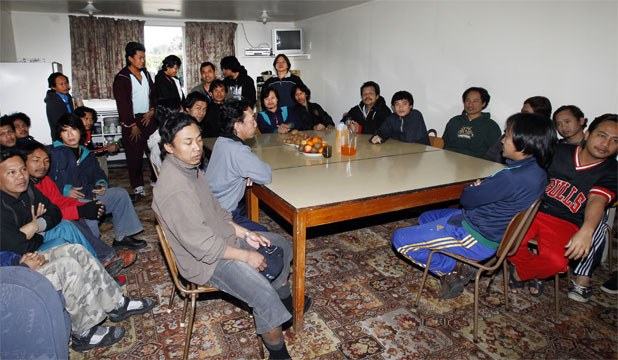 32 Indonesian fishermen previously working aboard the Korean fishing vessel Oyang 75 are currently ashore in Christchurch. These workers are seeking redress for unpaid wages and other violations of their rights. Government policy mandates that the same terms and conditions be given to workers on foreign charter vessels in New Zealand waters as to local citizens, but most members of the Indonesian crew are recieving annual incomes of between $6,700 and $11,600, well below the minimum wage.
32 Indonesian fishermen previously working aboard the Korean fishing vessel Oyang 75 are currently ashore in Christchurch. These workers are seeking redress for unpaid wages and other violations of their rights. Government policy mandates that the same terms and conditions be given to workers on foreign charter vessels in New Zealand waters as to local citizens, but most members of the Indonesian crew are recieving annual incomes of between $6,700 and $11,600, well below the minimum wage.
The crew recently used what little money they have to appeal their looming deportation. Not currently working and not eligible for welfare in New Zealand the workers are reliant on donations of food and money. Workers Party Christchurch branch organiser Byron Clark and branch secretary Kelly Pope met with the crew on Saturday (Aug. 13) and delivered 20kg of rice donated from the Christchurch Workers Party branch and a bag of vegetables donated by the Okeover community garden.
“These young men- and I was surprised by how young they all are- really demonstrate the way migrant labour is exploited in New Zealand” said Clark. “These sailors suffered beatings, overwork, sexual harassment and inadequate pay while working in this country’s economic zone, and now the state wants to deport them before those grievances have been addressed”
The Workers Party is planning further solidarity work with the Indonesian crew. The Canterbury Indonesian Society is collecting donations for food and other expenses incurred by the crew, such as accommodation and the school fees of their children in Indonesia. they can be made to the account 12 3147 0278609 00 with the reference ‘Fishing Crew’.
Anti-Youth Rates protests send signal to government (regional round-up, photos)
By Byron Clark, Jared Phillips, and Chris Matahaere
On June 25 Unite and other progressive organisations, as well as socialists, sent a message to the government that any attempt to reintroduce youth rates will be met with resistance. These protests were very much the beginning and will be intensified – up to and including strikes and high school demonstrations – if the government does pursue a reintroduction. The Auckland and Wellington demonstrations went ahead successfully, with the Auckland demonstration being focussed on the head offices of the Employers and Manufacturers Association, whose CEO had in a radio interview justified the gendered wage gap by claiming that women are less productive because of ‘monthly sick problems’. The Auckland protest drew the connection between unequal pay for women and the potential for discriminatory rates to be applied to young workers. Below is a summary of activities in other major cities. Continue reading “Anti-Youth Rates protests send signal to government (regional round-up, photos)”

